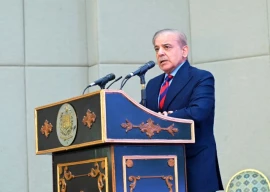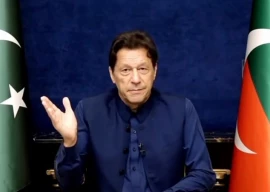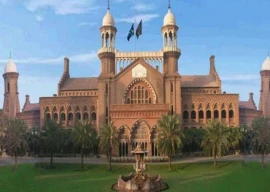
With the NA-19, Haripur by-polls around the corner, the use of biometrics is on the cards. According to reports in the local media, the Election Commission of Pakistan has decided to use the thumb authentication system in 50 selected polling stations on August 16.
The news of biometrics has brought the Telephone Industries of Pakistan (TIP) back into the fold.
The strategic industry, controlled by the federal IT ministry, has had the honour of manufacturing the country’s first local energy meters, telephone sets and exchanges, printed circuit boards, mobile exchanges and most importantly, the electronic voting machine (EVM) itself.
Already approved
A former TIP employee Haji Muhammad Ashraf, who remained part of the experimental manufacturing of the machine back in 2011, said the device was okayed by the ECP as a simple, effective and trustworthy machine. Unfortunately, the donor agency funding the project shied away from handing the contract to a Pakistani company.
With the idea shelved, TIP remained purposeless for years and as a result sacked over 800 contractual employees in 2014. Locals have urged the ECP to use TIP’s EVMs which will serve a dual purpose – ensure transparent polling on Election Day and give the industry a new lease of life.

“It’s a very promising idea to use EVMs manufactured by our very own company. They should not just be used in Haripur but also in the upcoming local government polls in Punjab,” said social activist Ziafat Khan. “Owing to ill-conceived policies and corrupt practices, a revenue generating, vibrant industrial unit is languishing.”
Cheaper by the dozen
The EVM was the brainchild of Engineer Arif who said TIP ran a demo of the machine in front of political activists, journalists and ECP officials and won their approval.
“Our product costs Rs32,000 to Rs34,000 while imported devices are priced up to Rs50,000,” he said. Arif said a single unit takes about 50 to 55 minutes to manufacture and the entire project requires only 100 TIP workers.
“The ECP refused to pay about 40% of the cost in advance which the TIP badly needed given its financial troubles. This is what brought the initiative to a standstill,” Arif added. He said utilising the TIP’s expertise will help its 2,000 workers and thousands of pensioners make ends meet.
No local or provincial official from the ECP confirmed the hearsay, despite repeated attempts.
The system is also being opposed in numerous circles. Former Pakistan Peoples Party MPA Dr Faiza Rasheed said her party has always supported the cause. However, around 75% of the constituency’s voters belong to rural areas and the implementation of the system prior to any awareness drives could have its own ramifications.
Ahsan Khan, a social scientist, said the experiment of SIM card verification proved awareness was vital so voters can utilise the system appropriately.
Citing India’s example, he said the neighbour has been using EVMs since 1999 but conducted numerous educational campaigns prior to the system’s enforcement. “Hardly three weeks are left for the polls. Without educating voters, it will be very problematic,” he added. However, he supported the idea of starting off with the Punjab LG polls.
Published in The Express Tribune, July 16th, 2015.














1715142871-0/imfsalary-(1)1715142871-0-270x192.webp)










COMMENTS
Comments are moderated and generally will be posted if they are on-topic and not abusive.
For more information, please see our Comments FAQ